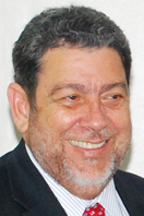
KINGSTOWN, St. Vincent – Knowing that he has lived many more years than he has remaining, Prime Minister Dr. Ralph Gonsalves has been prompted into “a greater impatience and a preference for a strenuous life over that of an ignoble ease”.
And this month, he wrote a strongly worded letter to CARICOM secretary-General Edwin LaRocque about his assessment of the state of affairs within the 15-member regional bloc.
“A central failure in the design, and functioning, of CARICOM is that its focus has been on integrating state institution and trading regimes, and not on the people themselves,” Gonsalves said in the eight-page letter. “… the people-centred matter of the freedom of movement of people, including hassle-free travel, remains substantially elusive”.
He said that while CARICOM leaders have repeatedly spoken of the implications of “this ‘free movement’ conundrum”, the people, in particular Jamaicans, Guyanese, St. Lucians, Grenadians, Dominican, and Vincentians, “remain largely dissatisfied”. Gonsalves said that while he was not “minimalizing the attendant challenges” of free movement, he was sure that CARICOM could do much better on this issue “if we truly commit to its resolution, in practical terms, being especially cognisant of our obligations in international law towards migrants, and the letter and spirit of CARICOM”.
Gonsalves, who last week celebrated 18 years as a Member of Parliament here, told LaRocque that while CARICOM has achieved much, “its extraordinary promise is yet to be fulfilled.” He said CARICOM’s “current mode of marking time, at a historical moment of overwhelmingly awesome challenges for our region which compelling demands a more profound integration, is mistaken.”
According to Gonsalves, while minimalism in integration has its attractions, it can be “fatal” to the well-being of CARICOM citizens. “… the times demand that we move resolutely beyond minimalism which inexorably leads to regression; ‘pausing’ is but a euphemism for standing still, which in a dynamic world is sliding backwards”.
He said that CARICOM was sliding backwards since leaders decided last year “to put the ‘single economy’ process on ‘pause’” even as integration accelerates elsewhere.
Gonsalves, who has been prime minister for 11 years, mentioned the Organisation of Eastern Caribbean States, which has moved “resolutely” towards an economic union. The Bolivarian Alliance for the Peoples of Our America – Peoples’ Trade Treaty (ALBA-TCP) recently resolved to move towards a single economic space and Gonsalves said more CARICOM countries are like to join the not-too-distant future, even as Haiti, Suriname and St. Lucia have formally signalled their intentions to do so.
He also spoke of the Community of Latin American and Caribbean States (CELAC), which determined last December “to embrace more decidedly political, trading, and functional cooperation between member-countries”.
“What are the implications for CARICOM?” he asked.
Regarding the four pillars of CARICOM – functional cooperation, coordination of foreign policy, security collaboration, and economic integration – Gonsalves said there has been “much success in the area of functional cooperation”. He, however, said “often one gets the impression that success is assured mainly when policies, programmes or projects are driven by the funding and will of an external agency even as foreign policy coordination is “patchy at best” and security collaboration is “largely in tatters”.
“On economic integration, the CARICOM trading regime is in place juridically, but it is undermined daily, for example, by the unfairness of effective subsidies granted on fuel to the producers of goods and services in one CARICOM member-state. On wider economic issues of critical importance in the ‘single market’ such as the freedom of movement of persons and attendant continent rights, the twists and contradictions are yet to be satisfactorily resolved,” Gonsalves said.
He said that CARICOM had “less-than-effective” administrative structures whose performance was “sub-optimal” even as repeated reviews of the CARICOM’s governance arrangements over the past 20 years has been “with little attainment of practical success”.
Gonsalves said that he “enthusiastically embrace” the call of CARICOM chair President Desi Bouterse of Suriname for meaningful change in the functioning of CARICOM, adding “breaking through the morass of an in-built lethargy in our collective regional political leadership, bureaucratic inertia, and public cynicism will not be easy”.
“We must make our union in CARICOM more perfect because it is a great cause for our people’s enduring benefit. I know about the restraints of ‘islandness’, territorial nationalism or even chauvinism, domestic priorities, philosophical differences, different regional emphases, and learned helplessness. Through the mist of all this, we have it in us to overcome these and other obstacles and limitations, through a deeper and better integration,” Gonsalves wrote.
He said that having “written too candidly” he probably “offended some or at least ruffled some feathers”.
“Years of unremitting toil in the regional political vineyard and the settled realisation that I have lived many, many more years than I have remaining to live, have prompted in me a greater impatience and a preference for a strenuous life over that of an ignoble ease,” he further stated.





